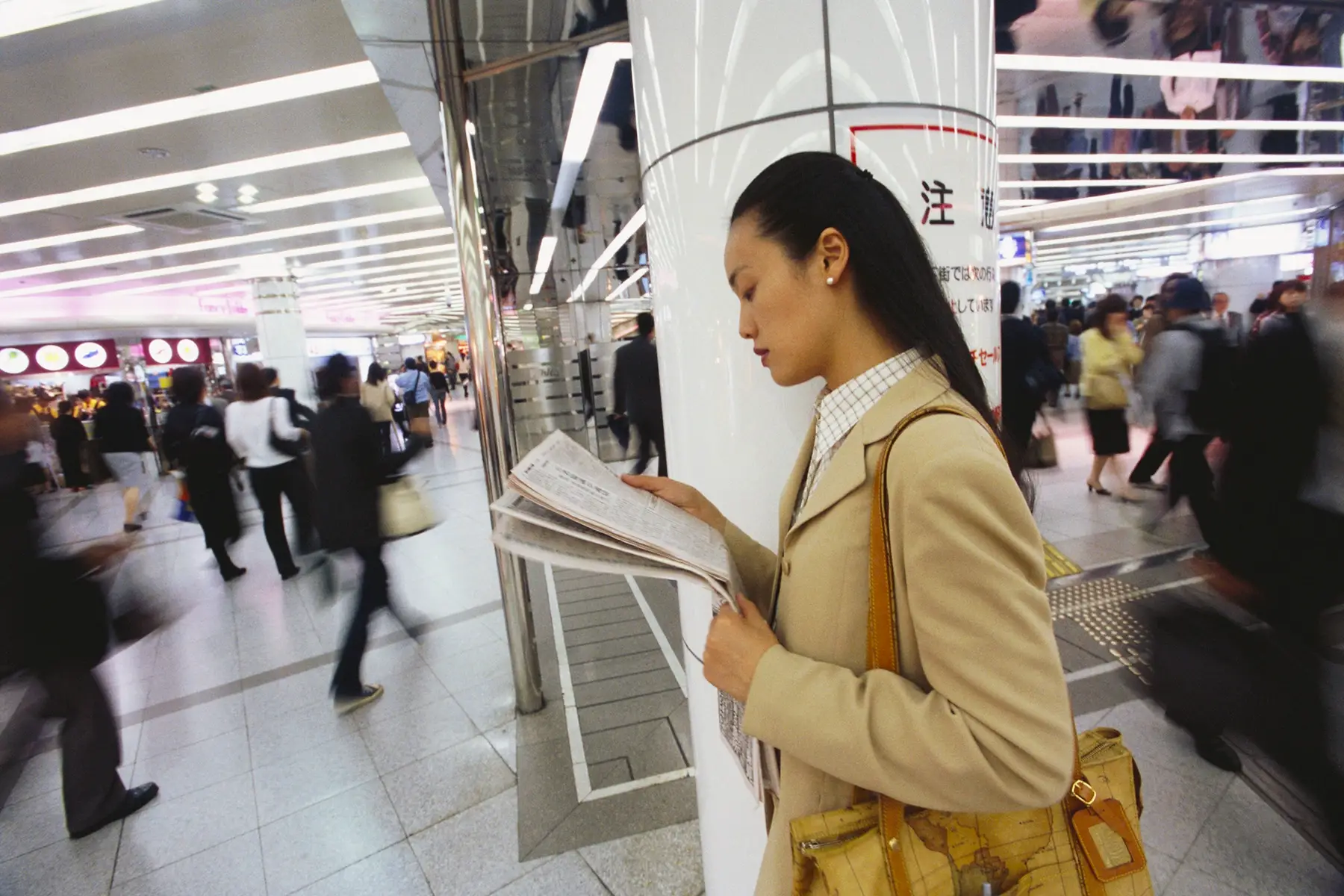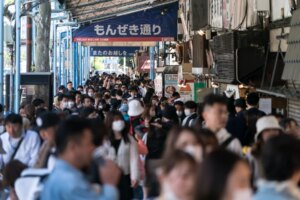Having access to local news is an important aspect of living in any country. Fortunately, if you happen to be moving to Japan, there are plenty of newspapers and English-language publications that provide all the latest updates.
As the world’s third largest economic zone, Japan is an important country on the world stage. To meet the demand for local news, international newsrooms and TV stations have specific teams and reporters that focus on the country.
Both Japanese and English newspapers have broad readerships, while independent websites and magazines focus on more specialist subjects. This ensures that all residents of Japan have quick access to varied news sources, both online and in print.
To help you navigate the world of news in Japan, this article provides the following information:
Ground News
Get every side of the story with Ground News, the biggest source for breaking news around the world. This news aggregator lets you compare reporting on the same stories. Use data-driven media bias ratings to uncover political leanings and get the full picture. Stay informed on stories that matter with Ground News.
The media landscape in Japan
Print media still reigns supreme in Japan, and three of the country’s newspapers make it onto the list of top 10 Asian newspapers by circulation. This includes the right-leaning Yomiuri Shimbun (読売新聞), which ranks as number one and is considered to be the most widely-read newspaper in the world with a daily circulation of 8.64 million across its morning and evening editions.

Asahi Shimbun (朝日新聞) comes in second with 5.90 million copies, while the Nikkei (日本経済新聞, Nihon Keizai Shimbun) (morning edition only) ranks in eighth place with 1.64 million.
Japan has five major Japanese-language newspapers: the Asahi Shimbun, Mainichi Shimbun (毎日新聞), Yomiuri Shimbun, Sankei Shimbun (産経新聞), and the Nikkei (which also owns the Financial Times). All of these now offer English-language news, too, either through original reporting, translation, and/or online offshoots of the paper.
Original English-language news also has a storied history in Japan. The Japan Times has been delivering reportage to expats since 1897, while Kyodo News (共同通信, Kyodo Tsushin) is a popular wire service that publishes round-the-clock reporting in English with stories that are syndicated in major newspapers.
Nippon Hoso Kyokai (日本放送協会), which is more commonly known as NHK, is a Japanese public broadcaster and is considered to be one of the most reliable news sources in Japan. It offers daily news updates in English via NHK World-Japan on cable TV, as well as its YouTube channel and podcast feeds.
Media control and trust in Japan
The major news dailies and NHK control much of the news in Japan. NHK is the only state-owned broadcaster and is funded by licensing fees and government subsidies. Its budget is also allocated by the national legislative body, the Diet.
NHK is said to operate with editorial independence; however, this has come under scrutiny in recent years, when an independent study found a conflict of interest in NHK’s reporting on the postponed 2020 Olympic Games.
Moreover, Japan-based reporters often have to get information from kisha kurabu (記者クラブ), or “press clubs”, which foreign journalists and freelancers are usually restricted from joining. Notably, reporters at such clubs are given access to government and official sources but can be kicked out if they report unfavorably on those in power.
It is largely for this reason that Japan ranked 71st in the Reporters Without Borders World Press Freedom Index in 2022, dropping nearly 50 places since 2012. This also means that the boundary between right- and left-leaning Japanese newspapers is less apparent when discussing certain issues.
However, despite this, the Reuters Institute Digital News Report 2021 claims that 42% of Japanese respondents said they generally trust news sources. This is just shy of the 50% global average but a jump of five points from the previous year.
Where to get the news in English
English-language newspapers
Major daily online newspapers:
- Asahi Shimbun: Left-leaning
- Japan Forward By Sankei Shimbun: right-leaning
- Mainichi Shimbun: Left-leaning
- Nikkei (business-focused, behind a paywall): Right-leaning
- The Japan News by Yomiuri Shimbun: Right-leaning (also has a print edition)
Exclusively English-language newspapers:
- The Japan Times: Centrist, behind a paywall, distributed in print with the left-leaning New York Times International Edition
English-language news TV stations
- Channel NewsAsia: Provides 24/7 live news and documentary features on its YouTube channel covering Asia and Japan
- NHK World-Japan: Public broadcaster, generally in line with the right-leaning Liberal Democratic Party which has essentially been in power for the past 70 years
English-language news websites and social media
- Anime News Network: News updates and features for dedicated anime fans
- Gematsu: Frequent news updates on Japanese video games
- Japan Today: Provides news wire stories and independent reporting in English, also features a popular comments section
- Kyodo News: Round-the-clock original reporting on politics, business, and sports
- Metropolis: Lifestyle webzine with news, features, and reviews (free quarterly print edition available)
- The Asian Game: Breaking soccer news and analysis, covering Japan and Asia
- Tokyo Review: In-depth, Japan-focused news stories written by academics, journalists, and researchers
- Tokyo Reporter: Focuses on crimes and scandals in Japan and also features in major international newspapers
- Tokyo Weekender: News updates, features, interviews, travel guides (free bi-monthly print edition available)
In terms of social media, you can follow your favorite Japan-based reporters and publications on Twitter or LinkedIn.
Newspapers and magazines in Japan
Newspapers and weekly periodicals (週刊誌) remain popular in Japan, and print versions are particularly prevalent in the Japanese language.
National newspapers
All major news dailies have print subscription services, but only two – The Japan Times and the Japan News by Yomiuri Shimbun – still have English-language print editions. You can find these at selected newsagents and newsstands throughout Japan or subscribe to them online.

The Japan Times subscription service is fairly expensive at US$30 per month (or US$249 per year). That said, it is paired with the New York Times International Edition, alongside both weekend papers, so you get plenty of reading material each week.
Regional and local newspapers
Japanese-language regional newspapers, which are typically distributed in print, are popular sources of local news in the country. Although print runs change over time, there are still estimated to be more than 100 of them in circulation.
Japan is divided into 47 prefectures, and most of them have dedicated papers, but regional block papers are also in circulation. These include the Kahoku Shimpo (河北新報), Hokkaido Shimbun (北海道新聞), Chugoku Shimbun (中国新聞), and Nishi-Nippon Shimbun (西日本新聞)).
Weekly or periodical newspapers or magazines
- Asia-Pacific Journal – Japan Focus: An online, peer-reviewed journal featuring analysis and investigative reporting on key issues, with new stories featured in its monthly newsletter
- Shukan Bunshun (週刊文春): An influential, weekly Japanese-language news magazine (print editions available)
- Shukan Shincho (週刊新潮): A conservative, Japanese-language weekly based in Tokyo (print editions available)
- Tokyo Journal: Quarterly magazine covering local news and features in English
- Weekly Toyo Keizai (週刊東洋経済, Shukan Toyo Keizai): In-depth coverage of newsworthy topics (English only available online)
Specialist newspapers
Japan has numerous specialist newspapers and magazines (雑誌). Indeed, if you go to your local newsagent or bookstore, you will see shelves stacked with publications that cover everything from sports and fashion to education and gardening.
However, for English-language publications that cover specialist subjects, you may want to explore alternative options (see other sections).
TV and radio stations in Japan
TV and radio stations are great ways to keep informed about the latest news in Japan, but how much you will gain from them will depend on your Japanese proficiency.
Many offer round-the-clock reports and are regarded as factual in their reporting, despite their political leanings. NHK is the best option for English speakers and Japanese learners. Below is an overview of the rest.
National TV and radio stations
Aside from NHK, several privately owned major TV stations operate on the national level:
- Fuji TV (フジテレビ)
- Nippon TV (NTV) (日本テレビ)
- Tokyo Broadcasting System (TBS) (TBSテレビ)
- TV Asahi (テレビ朝日)
- TV Tokyo (テレビ東京)
The radio landscape is also dominated by several major corporations:
- Inter FM and J-Wave: Tokyo-based commercial music stations
- Japan FM: News, culture, music, and more
- NHK: Various channels covering news, culture, music, and more
- TBS Radio: News channel operated by Tokyo Broadcasting System
Regional TV and radio stations
Similar to print media, regional TV stations are popular throughout Japan. While offerings vary depending on your location, most of the national news providers have affiliates that broadcast local news, entertainment, and programming. TNX television stations, which are run by TV Tokyo, operate in Kyushu, Hokkaido, Kansai, Hokuriku, and more.
Meanwhile, Nippon News Network (NNN) (日本ニュースネットワーク) stations, which are operated by NTV, and ANN stations, which are run by TV Asahi, deliver programming in similar regions.
Each prefecture of Japan also has dedicated radio stations. Just tune into the local airwaves to find these.
Podcasts
Listening to English-language podcasts is one of the easiest ways to access the local news in Japan.
There are a few of them to choose from, including:
- Deep Dive by The Japan Times: weekly discussion podcast on a newsworthy topic
- News in Slow Japanese: news podcast for Japanese-language learners
- NHK World-Japan: daily English news podcast
News websites in Japan
Japan is a highly digital country, and as of July 2022, there were an estimated 118.6 million internet users, comprising 93% of the population. This may have contributed to the decline of newspaper (i.e., print media) distribution from 47.8 million (2012) to just under 31 million (2022).

All of Japan’s major publications have websites that publish the same stories that make it into their print editions. The advantage of online news is that stories may feature an English translation, but if not, you can simply run them through a translator (DeepL is particularly accurate for Japanese-English translations).
News websites like the Japan Times, Nikkei, and Mainichi Shimbun are popular among expats. However, many people still prefer international publications with dedicated reporters and contributors based in Japan, such as:
Social media news sources in Japan
Like everywhere in the world, social media is a growing source of news in Japan. Twitter is particularly popular, with around 45 million active daily users in the country. Interestingly, Japan may be the only nation where Twitter is more popular than Facebook.
Despite this, social networking sites are generally considered to be less effective at disseminating news than broadcasters and newspapers because of the power of traditional media.
Journalists working at the local level are more likely to break stories on Twitter that haven’t been covered by the major news conglomerates.
The online petition site Change.org has also proved to be an important tool for raising awareness of social issues in Japan. Recent examples include opposition to under-reported construction projects in Tokyo and a petition to overturn the government’s “excessive” border controls during the COVID-19 pandemic.
As Japan is prone to natural disasters, social media has also played a key role in notifying users of earthquakes and typhoons, including warnings, advisories, emergency procedures, and impacts on public transport.
There’s also an app in Japan called Flipboard that creates news feeds for users based on their chosen topics. This can be particularly helpful for expats wanting to stay up to date with all the latest information on a specific issue.
Alternative news and citizen journalism
Traditional news institutions are still the go-to sources for news in Japan, even among the young. In fact, according to a Nippon Foundation poll in 2019, more than 80% of 18-year-olds get their news primarily from television.
These respondents also considered television and newspapers to be by far the most reliable sources. This means citizen journalism has failed to gain a significant foothold, partly because its history is full of public mistrust and failed ventures.

That said, some independent, non-profit organizations, such as the award-winning Tansa, have managed to buck the trend. The Tansa newsroom publishes bilingual, investigative reports on stories that are generally not covered in the mainstream Japanese media.
It is funded by donations, foundation grants, and proceeds from its journalism courses.
Similarly, Hangorin no Kai (反五輪の会) is a citizen activist group that publishes reports on its Tumblr page. The group is known for its opposition to the Olympic Games, both domestically and abroad.
This stemmed from the government’s displacement of the homeless and people in social housing to build venues for Tokyo 2020. Hangorin no Kai now focuses more broadly on homeless issues in Japan.
Substack
Substack has become one of the world’s most popular platforms for independent journalism and in-depth analysis, free from corporate interests. Several highly respected Japan-based, English-language columnists have started Substack publications.
You can sign up with any of these to receive newsletters to your email address upon publication of new stories. The following are all free:
- Japan Economy Watch: An economy-focused newsletter by Richard Katz, who has been covering Japan’s economy for more than four decades
- Japan Optimist: A newsletter on the Japanese economy, published by longtime Japan resident and financial expert Jesper Koll
- Observing Japan: Commentary on Japanese politics and foreign affairs by Tobias Harris, a leading expert in the field
- Robert Whiting’s Japan: Best-selling author Robert Whiting covers all things Japan (there are also paid subscription options to access more content)
Japan news sources to avoid
The term “fake news” has entered the Japanese lexicon in recent years. Indeed, there are numerous blogs and independent websites filled with conspiracy theories and unreliable information.
However, based on the presentation and content, these will be obvious to most readers at the outset.
The weekly Japanese-language tabloids, including the Shukan Shincho, Shukan Bunshun, Shukan Josei (週刊女性), and Shukan Taishu (週刊大衆), are widely read but are open to sensationalism. Stories of weekly tabloids paying sources, doctoring photos, and reporting rumors based on little evidence are not unheard of. Therefore, readers should proceed with caution.
Tips on getting reliable Japan news
There are some resources out there specifically designed to help you assess news articles and sources for accuracy, bias, and reliability. Some of the services operating in Japan include:
These services rank organizations such as Yomiuri Shimbun, Japan Today, NHK World-Japan, and The Japan Times as having high degrees of factual reporting. The Japan Times also fits into the “least biased” rating category.
Here are a few tips to help you find reliable news sources while living in Japan:
- Cross-check news by using multiple sources with different political leanings rather than just relying on a single news source
- Ask locals in Japan, like your neighbors or coworkers, which sources they use and suggest
Notably, there are also trusted investigative journalists in Japan who have written books on social issues in the country and write for various publications. Major names include David McNeill, Richard Lloyd Parry, Ilgin Yorulmaz, Martin Fackler, and Jon Mitchell. You can follow them on Twitter to keep up to date with their work.
Useful resources
- Live Work Travel Japan – a Facebook community that helps expats relocating to Japan
- Tokyo Expat Network – a Facebook group where you can ask fellow residents where they get their news, among other questions







